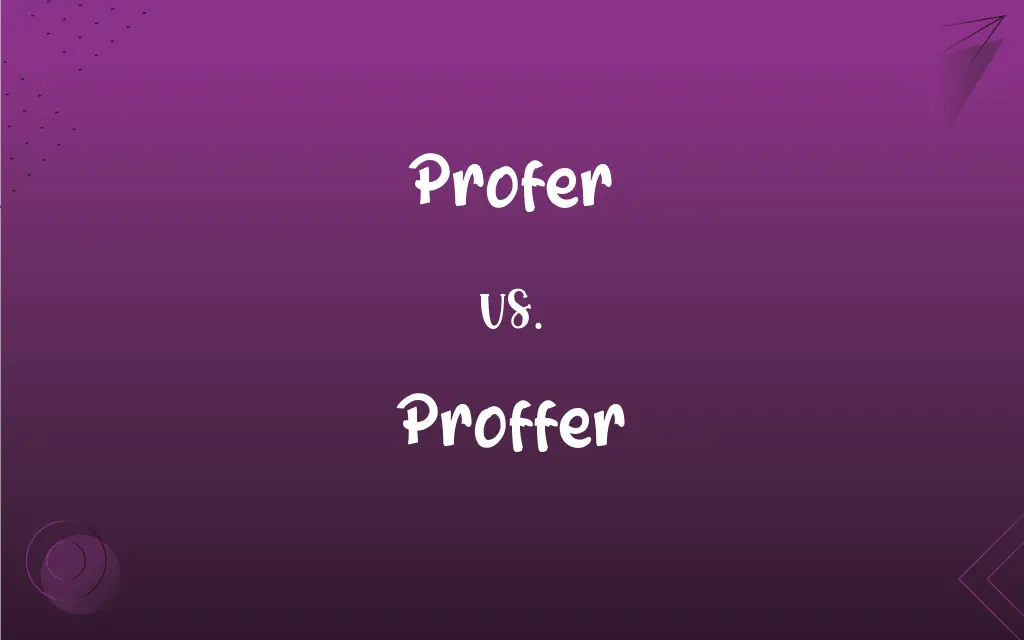Profer vs. Proffer: What's the Difference?
By Janet White & Harlon Moss || Updated on May 22, 2024
Profer is a lesser-known term meaning to profess or declare, while Proffer means to offer or present something for acceptance. Both share similar roots but differ in usage and context.

Key Differences
Profer means to profess or declare something formally. It's an archaic term rarely used in modern English, often seen in older literary works. Proffer, on the other hand, is commonly used to mean offering or presenting something for acceptance, such as advice or a proposal.
Profer is not typically encountered in everyday language, making it more obscure. It implies a sense of formality in declaring or asserting something. Proffer, however, is a standard word in contemporary usage, frequently appearing in both spoken and written contexts when someone offers something tangible or intangible.
Profer's rarity means it's often unfamiliar to many English speakers, whereas proffer is widely recognized and understood. The primary context for profer is historical or legal documents, while proffer appears in various settings, including business and casual conversations.
Profer and proffer derive from similar Latin roots but have evolved differently in the English language. Proffer's usage is more practical and everyday, whereas profer has an almost archaic, literary feel.
Profer may be encountered in classical literature, adding a formal tone to the text. In contrast, proffer is versatile and practical, used in scenarios where an offer is being made, from legal contexts to daily interactions.
ADVERTISEMENT
Comparison Chart
Definition
To profess or declare formally
To offer or present something for acceptance
Usage Frequency
Rare, archaic
Common, contemporary
Context
Historical, literary
Everyday, business, legal
Recognition
Obscure to many speakers
Widely recognized and understood
Origin
Similar Latin roots
Similar Latin roots
ADVERTISEMENT
Profer and Proffer Definitions
Profer
To announce publicly.
She did profer her intention to marry.
Proffer
To put forward for consideration.
He proffered an apology for his mistake.
Profer
To profess formally.
He did profer his allegiance to the king.
Proffer
To present something.
He proffered a solution to the problem.
Profer
To state as a fact.
The witness did profer the truth in court.
Proffer
To extend an offer.
They proffered a hand in friendship.
Profer
To declare openly.
The knight did profer his loyalty.
Proffer
To make an offer.
The company proffered a new contract.
Profer
To make a declaration.
He did profer a challenge to the opponent.
Proffer
To offer for acceptance; tender
"Mr. van der Luyden ... proffered to Newland low-voiced congratulations" (Edith Wharton).
Profer
To utter; to pronounce.
Proffer
The act of proffering; an offer.
Profer
To deliver.
Proffer
An offer made; something proposed for acceptance by another; a tender.
Proffer
(obsolete) An attempt, an essay.
Proffer
To offer for acceptance; to propose to give; to make a tender of.
To proffer friendship, a gift, or services
Proffer
To attempt or essay of one's own accord; to undertake or propose to undertake.
Proffer
To offer for acceptance; to propose to give; to make a tender of; as, to proffer a gift; to proffer services; to proffer friendship.
I reck not what wrong that thou me profre.
Proffer
To essay or attempt of one's own accord; to undertake, or propose to undertake.
Proffer
An offer made; something proposed for acceptance by another; a tender; as, proffers of peace or friendship.
He made a proffer to lay down his commission.
Proffer
Essay; attempt.
Proffer
A proposal offered for acceptance or rejection;
It was a suggestion we couldn't refuse
Proffer
Present for acceptance or rejection;
She offered us all a cold drink
Proffer
To offer for acceptance.
She proffered her resignation to the manager.
FAQs
What does profer mean?
Profer means to profess or declare formally.
How is proffer used in a sentence?
Proffer is used to mean offering something, e.g., She proffered her resignation.
Do profer and proffer have the same origin?
Yes, both terms derive from similar Latin roots.
Is profer commonly used today?
No, profer is considered archaic and rare.
Is profer found in modern literature?
Profer is mostly found in historical or classical literature.
How is proffer different from offer?
Proffer implies offering something formally for acceptance.
Is proffer used in legal terms?
Yes, proffer is often used in legal contexts.
Can proffer be used in formal contexts?
Yes, proffer is often used in formal contexts like business or legal settings.
Does profer have multiple meanings?
Profer primarily means to declare or profess.
Can you give an example of profer in a historical context?
"He did profer his loyalty to the king."
What is a common context for using proffer?
Proffer is commonly used when making formal offers or proposals.
Can proffer be used in casual contexts?
Yes, proffer can be used in casual contexts.
Can profer be used in everyday conversation?
It's unusual to use profer in everyday conversation.
What part of speech is proffer?
Proffer is a verb.
Can proffer be a noun?
Yes, proffer can also be a noun, meaning an offer or proposal.
Is there any scenario where profer is still used?
Profer might be used in historical reenactments or literary works.
How does proffer differ from suggest?
Proffer is more formal and implies offering for acceptance.
What does it mean to proffer advice?
To proffer advice means to offer advice formally for consideration.
What is a synonym for proffer?
A synonym for proffer is "offer."
Is profer a verb or a noun?
Profer is a verb.
About Author
Written by
Janet WhiteJanet White has been an esteemed writer and blogger for Difference Wiki. Holding a Master's degree in Science and Medical Journalism from the prestigious Boston University, she has consistently demonstrated her expertise and passion for her field. When she's not immersed in her work, Janet relishes her time exercising, delving into a good book, and cherishing moments with friends and family.
Co-written by
Harlon MossHarlon is a seasoned quality moderator and accomplished content writer for Difference Wiki. An alumnus of the prestigious University of California, he earned his degree in Computer Science. Leveraging his academic background, Harlon brings a meticulous and informed perspective to his work, ensuring content accuracy and excellence.































































